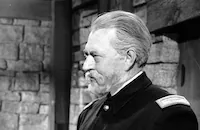Directed by actor Karl Malden, Time Limit is a courtroom drama minus the courtroom. Army Colonel William Edwards (Richard Widmark) is investigating the case of Major Harry Cargill (Richard Basehart), accused of collaborating with the enemy while he and his unit were held captive in a Korean POW camp. Cargill freely admits his guilt, and evidence proves that he signed a germ-warfare confession, and broadcast anti-American speeches over Korean radio. In fact, it would be a simple open and shut case were it not for Basehart's refusal to defend himself. Arousing further suspicion is the fact that Basehart's collaboration with the enemy immediately followed the death of two of his soldiers, and the surviving members in the unit all recite an identical, rehearsed account of those deaths. Under enormous pressure to take his depositions and press for a swift court-martial, Edwards delves into the mystery, refusing to accept superficial explanations for the events in question. When the truth is finally revealed by Lieutenant George Miller (Rip Torn), it sheds a completely new light on Cargill's behavior.
With its narrative structure primarily composed of depositions at the base camp and flashbacks to the POW camp, Time Limit closely resembles a stage play, which in fact, it was on Broadway. But the power of the original play, written by Henry Denker and Ralph Berkey, has not been diminished by its translation to film, and if anything, is even more powerful with its tense close-ups and claustrophobic settings. No doubt, Time Limit must have been a sobering drama for its day, with its conflicted central character - Major Cargill - exclaiming, "how long can a man be expected to play the hero? There should be a time limit on such a duty."
In addition to playing the lead, Richard Widmark also co-produced Time Limit and it was the actor's idea to have his friend and colleague , Karl Malden, direct it. In a 1988 interview about the film, Malden said, "Widmark thought I'd be good directing it, and I said 'Sure, I'd take a crack at it.' I liked what it had to say." Critics liked what it had to say, too, and gave Malden good reviews for his first directorial effort (It turned out to be his only directing credit with the exception of some scenes he filmed for Delmer Daves in The Hanging Tree, 1959). One reviewer praised the movie for it's "taut direction and vigorous performances drawn not only from principals, but a supporting cast of promising new-comers."
Producer: William Reynolds, Richard Widmark
Director: Karl Malden
Screenplay: Ralph Berkey (play), Henry Denker (also play)
Production Design: Serge Krizman
Cinematography: Sam Leavitt
Costume Design: Henry West
Film Editing: William Reynolds, Aaron Stell
Original Music: Fred Steiner
Cast: Richard Widmark (Col. William Edwards), Richard Basehart (Major Harry Cargill), Dolores Michaels (Corporal Jean Evans), June Lockhart (Mrs. Cargill), Carl Benton Reid (General Connors).
BW-97m.
by Bill Goodman























